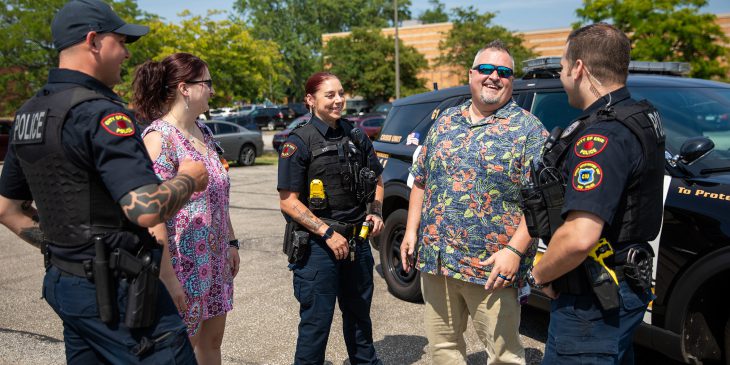This feature includes references to and accounts of difficult situations related to mental health, including suicide and abuse. If you are in crisis or need support, reach out to the Suicide and Crisis Lifeline via phone or text at 988.
Loud shirts are par for the course for Lew Nordin. It’s not just a fashion statement, though: In his role as a crisis clinician with UPMC Western Behavioral Health at Safe Harbor, Lew is one of two co-responders with the Erie Police Department. It’s a partnership that started in its current form in spring of 2023 and involves both training for police officers from Safe Harbor staff and a co-response unit called the Erie Police Crisis Unit, informally known as the “G-Unit.” (The department’s teams are all named alphabetically.) Hawaiian shirts are one of the ways that Lew helps to differentiate himself from the officers he responds alongside.
“Some people are averse to law enforcement for one reason or another,” Lew explains. “I wanted to make sure if I’m going out with officers, I don’t want to be identified as an officer.”
The co-response model empowers the person in crisis to choose who they want to speak with, and may create more potential avenues toward a successful outcome.
“There have been times I’ve gone out on a call with police and for one reason or another, the client just doesn’t want to talk to me — they’ll talk to the officer. Sometimes they won’t talk to anyone. But I think it eases the tension, having a social worker respond with law enforcement.”
Prior to the creation of the G-Unit, Lew handled crisis phone calls for Safe Harbor, including 988 calls, and provided mobile crisis response. Lew and his counterpart in the co-response program, Jamie Lewis, don’t spend much time answering phones or doing desk duty now: Their job is to always be available at a moment’s notice, just like the officers they respond alongside.
One important aspect of the co-response program is that it allows Lew and Jamie to spend additional time following up on individuals’ concerns, creating more of an ongoing relationship. Police responses to crisis situations are often more transactional and aimed at controlling the crisis in that moment. In the long-term, the goal of this co-response program and others like it is to reduce the use of police, courts, and incarceration in situations where behavioral health services are more appropriate.
“What is really cool is we go out and address the crisis, but then we have the opportunity to check in a month later, or three months later. The whole goal of it is to try to get these people help and stability so that the police aspect is not constantly a part of their life.”
The co-responder model was pioneered more than 30 years ago in Los Angeles and is a growing practice across the United States, but is still relatively uncommon. In Pittsburgh, there is not currently a co-response partnership, but resolve Crisis Services works closely with law enforcement to complement police work with crisis intervention both through mobile teams and a new program known as Mobile Expansion.
Alyssa Bauman, crisis clinician, walks a beat in downtown Pittsburgh as part of the Mobile Expansion program, which is intended to address a growing issue with unmet behavioral health needs in the area, especially among those who are unhoused. The program began in summer of 2023.
“We’re downtown because of the shown need for mental health services downtown,” Alyssa explains. “We try to ensure that rapid response: Having people stationed down here in the downtown area, we’re able to get to crises much quicker — and we can walk a beat.”
Alyssa and the Mobile Expansion team spend time in locations they know they’re likely to find people in need of their help.
“We spend time at the Carnegie Library downtown, we pop into the Office of Community Health and Safety, ROOTS, which stands for Reaching Out On The Streets — they specialize in engagement and outreach with the homeless population.”
 In the program’s first year, Alyssa says the program logged 537 crisis intervention encounters, supporting nearly 350 individuals. She also notes that the team has administered lifesaving Narcan treatment to a person in an overdose situation.
In the program’s first year, Alyssa says the program logged 537 crisis intervention encounters, supporting nearly 350 individuals. She also notes that the team has administered lifesaving Narcan treatment to a person in an overdose situation.
It’s the positive interactions and relationships that make Mobile Expansion a success to Alyssa.
“One encounter that really sticks with me is: There was a woman experiencing a manic episode in one of the businesses downtown,” Alyssa recalls. “Originally, 911 responded to that call, then the police reached out to us. When we arrived at the business, she was very, very fearful. She was surrounded by three officers who were doing well and being very respectful, but she was very, very uncomfortable and scared, and as soon as she saw us walk through the doors, her first response was, ‘Thank God it’s resolve.’”
“We were able to tell the officers, Hey, we’ve got this,’ and they were able to go about their duties. We ended up spending over an hour with her, calming her down, getting her to a safe place and reuniting her with her family.”
Like many first responder roles, behavioral health crisis response largely attracts a specific type of person: To be successful in the role, you have to be calm under pressure, knowledgeable, and supremely empathetic. Self-care is an absolute must and that’s where team support comes in.
“It becomes like a family,” Lew, says. “We check in with each other. One of the things we do as a team is respond to traumas. So if there is a death or near death and a family member or a friend either witnessed it or was affected by it, we go out as a team, respond to that, and then when we get back, the first thing the supervisor does is check in with us: ‘How are you doing? How did it go? Go ahead and take some time.’ There’s not many other jobs I’ve had that I can say I’ve felt like that kind of support and team atmosphere.”
That support, for the community and for one another, is some-thing that makes UPMC’s crisis teams an unforgettable group.
“Once you start meeting the team, instantly you’re drawn in and you get it,” says Noreen Fredrick, vice president, Community and Ambulatory Behavioral Health Services, UPMC Western Behavioral Health. “And I think it’s a service that we collectively as a system should be incredibly proud of. Just like all the other emergency responders that we have, this is another group of emergency responders who are just very dedicated. It’s a group you feel energized to be around.”
“They make you realize: This is why we do this.”
Read more about UPMC Western Behavioral Health crisis services, including phone and chat services supporting the 988 lifeline, and some tips from the experts on how to approach a situation in which you or a loved one faces a mental health crisis.









